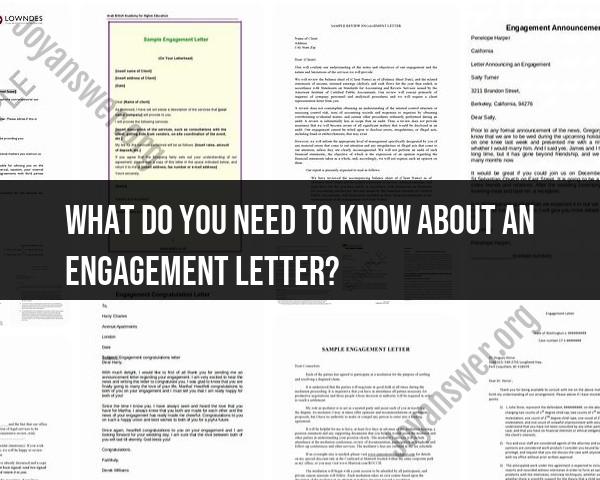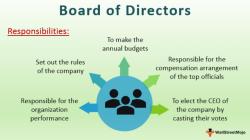What do you need to know about an engagement letter?
An engagement letter is a formal agreement between a service provider (such as an accountant, auditor, lawyer, consultant, etc.) and a client that outlines the terms, scope of work, responsibilities, and other relevant details for a specific engagement. It is a crucial document that helps establish clear expectations and avoid misunderstandings between the parties involved. Here are key considerations to keep in mind when dealing with an engagement letter:
Scope of Services:
- Clearly understand the scope of services outlined in the engagement letter. It should detail what specific tasks or activities the service provider will undertake on behalf of the client.
Objectives and Goals:
- Identify the objectives and goals of the engagement. Understand what the client expects to achieve through the services provided by the service provider.
Responsibilities of Each Party:
- The engagement letter should specify the responsibilities of both the service provider and the client. Each party's role and obligations need to be clearly defined to avoid misunderstandings.
Scope Limitations:
- Be aware of any limitations on the scope of the engagement. The engagement letter may explicitly state what is not covered by the agreement.
Terms and Conditions:
- Review the terms and conditions of the engagement, including the duration of the engagement, fee structure, payment terms, and any other contractual details.
Confidentiality and Data Security:
- Understand the provisions related to confidentiality and data security. The engagement letter may include clauses specifying how sensitive information will be handled and protected.
Termination Clauses:
- Check for termination clauses outlining the conditions under which either party can terminate the engagement. This could include non-performance, breaches of contract, or other specific circumstances.
Dispute Resolution:
- Be aware of any provisions related to dispute resolution. The engagement letter may outline the process for resolving disputes between the parties, such as through mediation or arbitration.
Insurance and Liability:
- Understand any provisions related to insurance and liability. The engagement letter may specify the extent of the service provider's liability and whether they carry professional liability insurance.
Amendments and Changes:
- Check if there are provisions allowing for amendments or changes to the engagement terms. If adjustments are needed, there should be a clear process for obtaining mutual agreement.
Governing Law:
- Identify the governing law clause, which specifies the jurisdiction whose laws will govern the interpretation and enforcement of the engagement letter.
Signatures and Acceptance:
- Ensure that the engagement letter is signed and accepted by both parties. Signatures indicate mutual agreement and acceptance of the terms outlined in the document.
Understanding the Industry and Regulatory Requirements:
- If applicable, ensure that the engagement letter complies with industry standards and regulatory requirements relevant to the services being provided.
Communication and Reporting:
- Clarify the communication and reporting expectations between the service provider and the client. Understand how progress will be communicated and what reports or deliverables will be provided.
Reviewing and understanding these considerations before signing an engagement letter is crucial for establishing a clear understanding between the service provider and the client. If there are any uncertainties or if certain terms are unclear, it is advisable to seek clarification from the service provider or legal counsel. Clear and comprehensive engagement letters contribute to successful and transparent professional relationships.
What do you need to know about an engagement letter in professional services?
An engagement letter is a contract between a professional services provider (such as an accountant, lawyer, or consultant) and a client that outlines the terms and expectations of the professional relationship. It is an important document that helps to protect both the client and the professional.
Here are some of the key things you need to know about engagement letters:
- Engagement letters should be in writing and signed by both the client and the professional.
- Engagement letters should clearly define the scope of services to be provided. This includes the specific tasks that the professional will perform, as well as the level of service to be provided (e.g., consultation, advisory, implementation).
- Engagement letters should specify the fees to be charged and the method of payment.
- Engagement letters should outline the responsibilities of the client and the professional. This includes the client's responsibility to provide accurate and complete information, as well as the professional's responsibility to maintain confidentiality.
- Engagement letters should specify the timeframe for completion of the engagement.
How does an engagement letter outline the terms and expectations of a professional relationship, and what information should it contain?
An engagement letter outlines the terms and expectations of a professional relationship by:
- Clearly defining the scope of services to be provided
- Specifying the fees to be charged and the method of payment
- Outlining the responsibilities of the client and the professional
- Specifying the timeframe for completion of the engagement
Here is some of the information that should be contained in an engagement letter:
- The names and contact information of the client and the professional
- The date of the engagement
- A description of the services to be provided
- The fees to be charged and the method of payment
- The responsibilities of the client and the professional
- The timeframe for completion of the engagement
- Any other relevant terms and conditions
Are there legal or ethical considerations associated with drafting and using an engagement letter?
Yes, there are legal and ethical considerations associated with drafting and using an engagement letter.
Legal considerations:
- Engagement letters should be drafted in accordance with the laws of the jurisdiction in which the services will be provided.
- Engagement letters should be clear and concise, and should avoid using legal jargon.
- Engagement letters should be reviewed by an attorney before they are signed.
Ethical considerations:
- Professional services providers have a duty to act in the best interests of their clients.
- Engagement letters should not include any terms or conditions that could be construed as a conflict of interest.
- Engagement letters should be fair and reasonable, and should not take advantage of the client.
Overall, engagement letters are important documents that help to protect both the client and the professional. By carefully drafting and using engagement letters, professional services providers can minimize the risk of misunderstandings and disputes.













